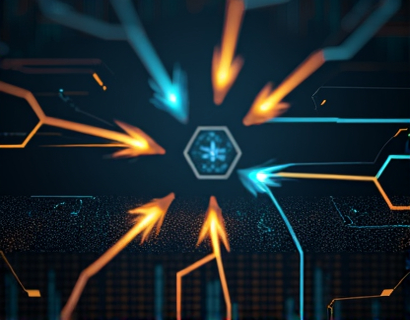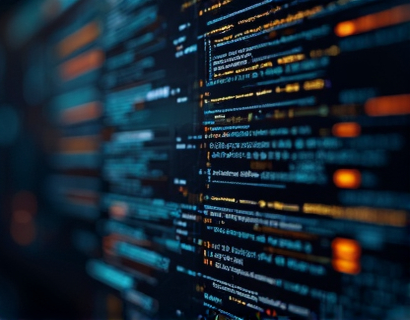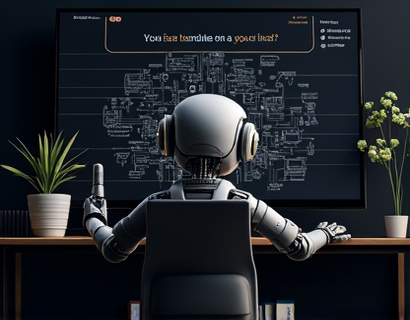AI and Crypto: Pioneering Financial Innovation for the Digital Age
The convergence of artificial intelligence (AI) and cryptocurrency is ushering in a new era of financial innovation, transforming the way we perceive and interact with digital finance. This integration is not just a technological advancement but a paradigm shift that promises a more efficient, secure, and personalized financial experience. As we delve into this transformative landscape, it's essential to understand the key components and potential of this synergy, particularly for tech enthusiasts and financial innovators.
The Intersection of AI and Cryptocurrency
AI and cryptocurrency intersect at multiple points, each contributing to the evolution of financial systems. AI's capabilities in data analysis, pattern recognition, and predictive modeling are particularly well-suited to the complex and dynamic nature of cryptocurrency markets. By leveraging these technologies, financial institutions and fintech startups can enhance their operations, improve security, and offer more tailored services to users.
One of the primary areas where AI and cryptocurrency converge is in market analysis and trading. AI algorithms can process vast amounts of data from various sources, including social media, news feeds, and historical price data, to identify trends and predict market movements. This capability is invaluable for traders and investors who seek to make informed decisions in the volatile crypto market.
Enhanced Security Through AI
Security is a paramount concern in the cryptocurrency space, given the decentralized and often anonymous nature of transactions. AI plays a crucial role in bolstering security measures by detecting and mitigating fraudulent activities. Machine learning models can analyze transaction patterns to identify anomalies that may indicate fraud or cyberattacks. This proactive approach helps in safeguarding user assets and maintaining the integrity of the blockchain network.
Moreover, AI-driven identity verification systems can enhance the onboarding process for users, ensuring that only legitimate individuals gain access to crypto platforms. By using biometric data and behavioral analysis, these systems can provide a robust layer of security, reducing the risk of unauthorized access and enhancing user trust.
Personalized Financial Services
The integration of AI and cryptocurrency is also revolutionizing the way financial services are delivered, making them more personalized and user-friendly. AI algorithms can analyze user data to create customized investment portfolios, offering recommendations based on individual risk tolerance, financial goals, and market conditions. This level of personalization is a significant departure from traditional financial services, which often rely on one-size-fits-all approaches.
Furthermore, AI-powered chatbots and virtual assistants can provide 24/7 support to users, answering queries, and guiding them through complex financial processes. These tools not only improve user experience but also reduce the operational costs for financial institutions, making high-quality services more accessible.
Smart Contracts and Automated Processes
Smart contracts, self-executing contracts with the terms directly written into code, are another area where AI and cryptocurrency intersect. These contracts can automate various financial processes, from payments and settlements to compliance and auditing. By eliminating the need for intermediaries, smart contracts reduce transaction costs and increase efficiency.
AI can further enhance the functionality of smart contracts by providing predictive analytics and real-time data feeds. This integration allows for more dynamic and responsive contracts that can adapt to changing market conditions or user preferences. For instance, an AI-driven smart contract could automatically adjust the terms of a loan based on the borrower's credit score fluctuations or market interest rates.
Decentralized Finance (DeFi) and AI
Decentralized Finance (DeFi) is an emerging sector that leverages blockchain technology to create open, permissionless financial systems. AI plays a pivotal role in DeFi by optimizing protocols, enhancing risk management, and improving user experiences. AI algorithms can analyze decentralized protocols to identify inefficiencies and propose improvements, ensuring that the DeFi ecosystem remains robust and user-friendly.
In lending and borrowing platforms, AI can assess creditworthiness more accurately by considering a broader range of data points, including non-traditional credit history. This approach can democratize access to credit, particularly for underserved populations. Additionally, AI can help manage liquidity by predicting market demand and adjusting supply accordingly, reducing the risk of price volatility.
Challenges and Considerations
While the integration of AI and cryptocurrency offers numerous benefits, it also presents challenges that need to be addressed. One of the primary concerns is the regulatory landscape. As AI and cryptocurrency continue to evolve, regulators are grappling with how to oversee these technologies to prevent misuse and ensure consumer protection. Financial institutions and fintech companies must navigate this complex regulatory environment, ensuring compliance while innovating.
Another challenge is the technical complexity involved in integrating AI with blockchain technology. Developing robust and scalable solutions requires expertise in both domains, which can be a barrier for some players in the market. Collaboration between AI experts and blockchain developers is essential to overcome these technical hurdles and create seamless, efficient systems.
The Future of Financial Innovation
The future of financial innovation lies in the continued synergy between AI and cryptocurrency. As these technologies mature, we can expect to see even more sophisticated applications that enhance the financial ecosystem. For instance, AI-driven predictive analytics could become a standard tool for risk assessment and portfolio management, providing deeper insights and more accurate forecasts.
Moreover, the rise of central bank digital currencies (CBDCs) presents an opportunity for AI to play a central role in central banking. AI can help central banks design and implement CBDCs that are secure, efficient, and user-friendly, potentially transforming the traditional banking system. This could lead to a more inclusive financial system, where unbanked populations gain access to essential financial services.
In conclusion, the integration of AI and cryptocurrency is not just a technological trend but a fundamental shift in how we approach financial services. By embracing these innovations, we can create a more efficient, secure, and personalized financial landscape that meets the needs of the digital age. For tech enthusiasts and financial innovators, this is an exciting time to explore the endless possibilities at the intersection of AI and cryptocurrency.










































